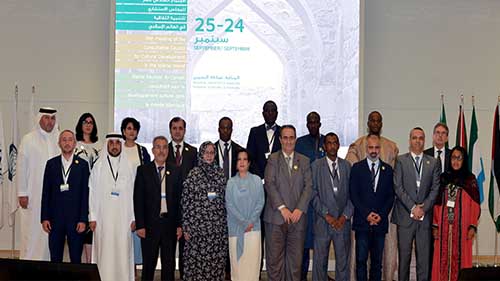24 September 2018
The 16th Meeting of the Consultative Council for Cultural Development in the Islamic World Kicks Off


On Monday, 24 September, 2018, working sessions of the 16th Meeting of the Consultative Council for Cultural Development in the Islamic World kicked off in Bahrain as part of the celebrations of Muharraq as the Capital of Islamic Culture 2018.
During the inaugural session, H.E Shaikha Mai bint Mohammed Al Khalifa, President of the Bahrain Authority for Culture & Antiquities stressed the importance of holding such a gathering for the Arab and Islamic worlds. H.E added said “ We remain very proud of our geographical and historical identities, which should be reflected through our achievements and vision in real life paradigms; indeed the cultural and artistic heritage that we have places us among the developed countries honouring their universal deeply-rooted heritage”. H.E President of Bahrain Authority for Culture & Antiquities has called on the Arab and Islamic countries to support Muharraq as the Capital of Islamic Culture 2018 and to back up her call on UN Educational, Scientific and Cultural Organization (UNESSCO) to adopt a resolution to proclaim November 18 of each year as International Day of Islamic Art. H.E also invited the delegates to attend the inauguration ceremony of Pearling Path Visitor Center, scheduled during the Extraordinary Islamic Conference of Culture Ministers in Manama, on 28-29 November 2018.
Mr. Mohammad Al-Ghammari, the Director of Consultative Council’s Secretariat, the General Assembly and the Specialized Ministerial Conferences, said in his speech, on behalf of the Organisation of Islamic Cooperation that this meeting comes to face challenges to development, Israeli occupation and the spread of phenomena of extremism and sectarian in fights.
Mrs Mahla Ahmed, Director General for Social, Cultural and Family Affairs of the OIC, stressed, during her intervention, the importance of putting the cultural strategy in the Islamic world on top of OIC’s priorities. Mrs Ahmad added that there is an urgent need to link policies of cultural heritage protection with policies aimed at countering violent extremism, extremism, religious and cultural discrimination, xenophobia and Islamophobia according to the relevant stipulations of the UN charter and its principles. In addition, we should identify the economic, social and tourism aspects of cultural heritage in its different types and categories; and set aims and programs to develop and make better functional use of those aspects, she added.
The opening session ended by a speech by Mr Mr Karam Allah Hamid Khalaf Allah, Chairman of the Consultative Council, who called for an urgent need to elaborate a comprehensive strategy to preserve the cultural heritage, especially in Jerusalem. He added that we need to identify frameworks and establish modalities for enhancement of inter-state cooperation for protection of heritage and support of national and international efforts, within the framework of UN charter and the principles enshrined in it and include in this regard the subject of considering establishment of a Strategy of Joint Islamic Action for Protection of Cultural Heritage of the Muslim World in the cultural agenda of OIC with such a strategy giving the necessary and due respect and importance to all nations sovereignty and adhering to the principles of non-interference in member states’ internal affairs, henceforth rendering it help upon a nation’s request.
At the close of the two working sessions on enhancing the Islamic support for cultural heritage preservation, the Consultative Council in charge of Implementing the Cultural Strategy for the Islamic World called for redoubling efforts and strengthening the practical measures regarding the protection of tangible and intangible cultural heritage in Al-Qods Al-Sharif, in the light of the relevant international instruments and the guidelines set out in the Islamic Declaration on Safeguarding Cultural Heritage in the Islamic World. The Council invited Member States to promote their cooperation and coordinate their stances at the official and technical conferences and meetings organized by UNESCO and its bodies as well as the other international forums concerned with culture, education, media and human rights issues related to identity and culture, protect tangible and intangible cultural heritage and address the phenomena of extremism, racism and Islamophobia.
The meeting is attended by representatives of Islamic council Member states, representatives of the Organisation of Islamic Cooperation and the OIC’s Standing Committee for Information and Cultural Affairs (COMIAC).
Worth to mention that in order to implement the Cultural Strategy for the Islamic World, after the pattern of all subsidiary specialized strategies, specific mechanisms were established, such as the establishment of the Consultative Council in Charge of Implementing the Cultural Strategy for the Islamic World pursuant to the resolution of the 2nd Islamic Conference of Culture Ministers (Rabat, November 1998). It was entrusted with assisting ISESCO General Directorate in translating this Strategy into concrete terms. The Council also seeks to encourage cultural interaction and support the aspects of cultural diversity in the Member States, while preserving the cultural identity and protecting the independence of Thought. Other missions include the consolidation of complementarity and coordination among the specialized institutions of the Organization of Islamic Cooperation, in education, science, culture and communication, and among the Member States of ISESCO, and promote cooperation and partnership with similar governmental and non-governmental institutions sharing the same interest, inside and outside the Member States. The Council has convened more than 15 times ; 8 in ISESCO Headquarters, 7 in Riyadh, Algeria, Dakar, Sharjah, Baku and Khartoum.
The 10th Islamic Conference of Culture Ministers held in Khartoum, Republic of the Sudan, in 2017, adopted and appointed the members of the Consultative Council for Cultural Development in the Islamic World from Member States for a two-year term, renewable once, as follows: Hashemite Kingdom of Jordan, Kingdom of Bahrain, Union of Comoros, Republic of Tajikistan, Republic of Turkey, Republic of Kazakhstan, Republic of Togo, Republic of Sierra Leone, and the Republic of Niger.







